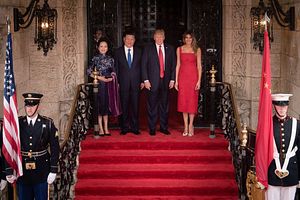This month, I’ve started a two-month visiting position at the Yale Law School’s China Center. As soon as I arrived at Yale Law School to begin my visit, following the release of the U.S. National Security Strategy (NSS) last month, the U.S. Department of Defense also released the National Defense Strategy (NDS). Together, these two are arguably the most important strategy documents that lay the foundation of U.S. grand strategy for the coming years or even decades. A careful review of these documents reveals some important ideas for the Trump administration’s approach toward the world as well as its policies toward China, with profound implications for U.S.-China relations and beyond.
For starters, the report made it clear that the rules-based world order led by the United States is currently being challenged from all directions. There are three main sources of threats. The first comes from the revisionist powers represented by China and Russia seeking to change the existing international order. The report argues that China is a strategic competitor that uses predatory economics to coerce its neighbors and at the same time militarizes the South China Sea. Russia, on the other hand, invades its neighboring territories and seeks to provide economic, diplomatic, and security measures to its neighboring countries opposing NATO.
The second source of the threat comes from rogue regimes represented by North Korea and Iran. They violate United Nations resolutions, undermine the rules-based order in regional affairs, and at the same time try to acquire weapons of mass destruction to threaten neighboring countries and create turmoil. The third and final source of threat comes from terrorist groups who also want to acquire weapons of mass destruction and attack the civilian population in the United States and abroad.
It is noteworthy that unlike previous strategy documents released by presidents George W. Bush and Barack Obama, which emphasized terrorist threats, both this national defense strategy and the previous national security strategy clearly pointed out that strategic competition among nations, rather than terrorism, is what the United States must first consider in order to safeguard its national security.
Needless to say, this is a huge signal. This shift means that the strategic repositioning of past U.S. administrations is being undone, and one can even say that the United States has also entered a new era. This new era is one focused on big power competition. The era also heralds the return of geopolitical competition. In view of the fact that Russia’s overall strength lags far behind the United States, the Washington’s primary rival can only be China.
The big question, of course, is whether strategic competition or rivalry with China will lead to disastrous consequences for both countries. Competition or rivalry is not necessarily a bad thing, as in economics, for instance, where healthy competition can lead to good outcomes. Even geopolitical competition, if conducted in a peaceful and healthy way, can lead to a greater provision of regional public goods and stabilize the regional order. There are many positive structural and agential reasons to believe that even an intense U.S.-China competition will not lead to unstable outcomes in Asia. Nuclear balance between the two, economic interdependence, self-restraint on both sides, and rational leadership, can all play a role in ensuring competition does not lead to negative outcomes.
That said, the biggest change in the United States’ strategic community now is a change in mentality. The recent strategy documents precisely confirm the collective anxiety of elites in the United States — namely that, when facing an increasingly powerful China, it is not clear what the United States should do about it. It seems that the big debate among U.S. elites on U.S. China policy has come to an end since 2015, when David Lampton famously talked about the “tipping point.” Perhaps elites in the United States have reached a consensus, which is that China should be regarded as a strategic competitor rather than as a strategic partner. Still, going forward, U.S. policy toward China may not necessarily shift toward confrontation because the costs of doing so will be far greater than the potential benefits.
Nevertheless, it will be interesting to see how these changes in the mindset of the United States will lead to policy changes in the next two years and beyond.

































